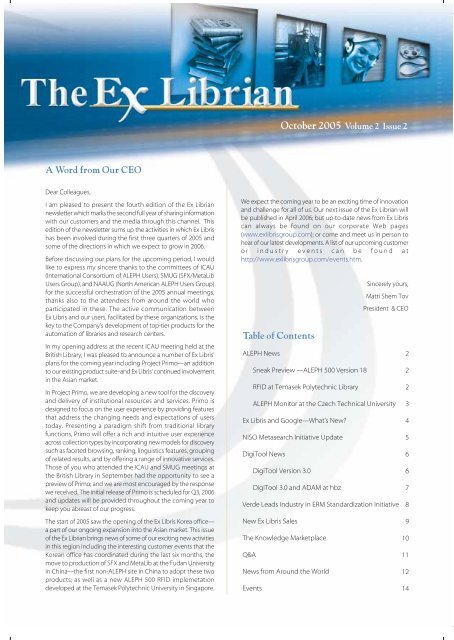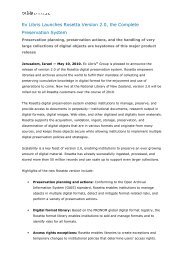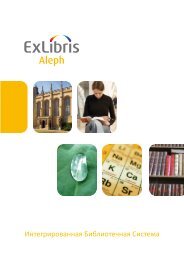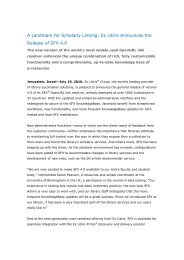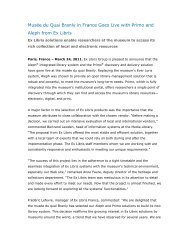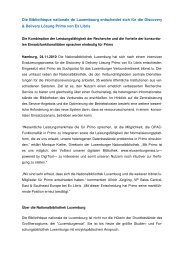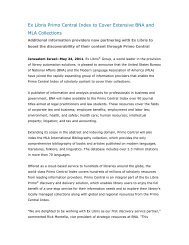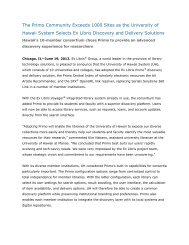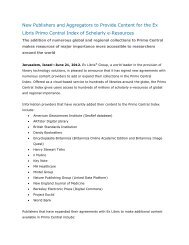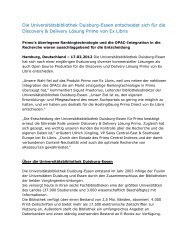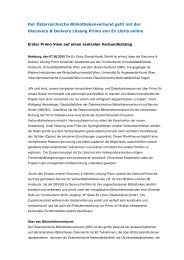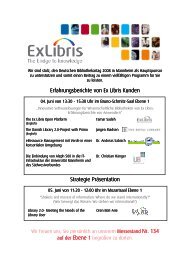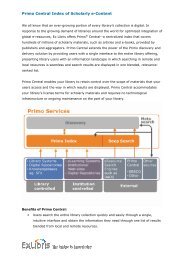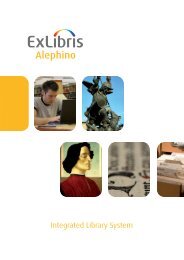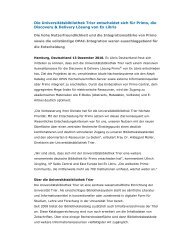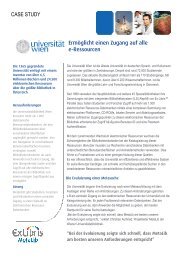October 2005 Issue - Ex Libris
October 2005 Issue - Ex Libris
October 2005 Issue - Ex Libris
Create successful ePaper yourself
Turn your PDF publications into a flip-book with our unique Google optimized e-Paper software.
A Word from Our CEO<br />
Dear Colleagues,<br />
I am pleased to present the fourth edition of the <strong>Ex</strong> Librian<br />
newsletter which marks the second full year of sharing information<br />
with our customers and the media through this channel. This<br />
edition of the newsletter sums up the activities in which <strong>Ex</strong> <strong>Libris</strong><br />
has been involved during the first three quarters of <strong>2005</strong> and<br />
some of the directions in which we expect to grow in 2006.<br />
Before discussing our plans for the upcoming period, I would<br />
like to express my sincere thanks to the committees of ICAU<br />
(International Consortium of ALEPH Users), SMUG (SFX/MetaLib<br />
Users Group), and NAAUG (North American ALEPH Users Group)<br />
for the successful orchestration of the <strong>2005</strong> annual meetings;<br />
thanks also to the attendees from around the world who<br />
participated in these. The active communication between<br />
<strong>Ex</strong> <strong>Libris</strong> and our users, facilitated by these organizations, is the<br />
key to the Company’s development of top-tier products for the<br />
automation of libraries and research centers.<br />
In my opening address at the recent ICAU meeting held at the<br />
British Library, I was pleased to announce a number of <strong>Ex</strong> <strong>Libris</strong>’<br />
plans for the coming year including Project Primo—an addition<br />
to our existing product suite–and <strong>Ex</strong> <strong>Libris</strong>’ continued involvement<br />
in the Asian market.<br />
In Project Primo, we are developing a new tool for the discovery<br />
and delivery of institutional resources and services. Primo is<br />
designed to focus on the user experience by providing features<br />
that address the changing needs and expectations of users<br />
today. Presenting a paradigm shift from traditional library<br />
functions, Primo will offer a rich and intuitive user experience<br />
across collection types by incorporating new models for discovery<br />
such as faceted browsing, ranking, linguistics features, grouping<br />
of related results, and by offering a range of innovative services.<br />
Those of you who attended the ICAU and SMUG meetings at<br />
the British Library in September had the opportunity to see a<br />
preview of Primo; and we are most encouraged by the response<br />
we received. The initial release of Primo is scheduled for Q3, 2006<br />
and updates will be provided throughout the coming year to<br />
keep you abreast of our progress.<br />
The start of <strong>2005</strong> saw the opening of the <strong>Ex</strong> <strong>Libris</strong> Korea office—<br />
a part of our ongoing expansion into the Asian market. This issue<br />
of the <strong>Ex</strong> Librian brings news of some of our exciting new activities<br />
in this region including the interesting customer events that the<br />
Korean office has coordinated during the last six months, the<br />
move to production of SFX and MetaLib at the Fudan University<br />
in China—the first non-ALEPH site in China to adopt these two<br />
products; as well as a new ALEPH 500 RFID implemetation<br />
developed at the Temasek Polytechnic University in Singapore.<br />
Table of Contents<br />
ALEPH News<br />
<strong>October</strong> <strong>2005</strong> Volume 2 <strong>Issue</strong> 2<br />
We expect the coming year to be an exciting time of innovation<br />
and challenge for all of us. Our next issue of the <strong>Ex</strong> Librian will<br />
be published in April 2006; but up-to-date news from <strong>Ex</strong> <strong>Libris</strong><br />
can always be found on our corporate Web pages<br />
(www.exlibrisgroup.com); or come and meet us in person to<br />
hear of our latest developments. A list of our upcoming customer<br />
or industry events can be found at<br />
http://www.exlibrisgroup.com/events.htm.<br />
Sneak Preview —ALEPH 500 Version 18<br />
RFID at Temasek Polytechnic Library<br />
ALEPH Monitor at the Czech Technical University<br />
<strong>Ex</strong> <strong>Libris</strong> and Google—What’s New?<br />
NISO Metasearch Initiative Update<br />
DigiTool News<br />
DigiTool Version 3.0<br />
DigiTool 3.0 and ADAM at hbz<br />
Verde Leads Industry in ERM Standardization Initiative<br />
New <strong>Ex</strong> <strong>Libris</strong> Sales<br />
The Knowledge Marketplace<br />
Q&A<br />
News from Around the World<br />
Events<br />
Sincerely yours,<br />
Matti Shem Tov<br />
President & CEO<br />
2<br />
2<br />
2<br />
3<br />
4<br />
5<br />
6<br />
6<br />
7<br />
8<br />
9<br />
10<br />
11<br />
12<br />
14
Sneak Preview of What's New<br />
and Improved in ALEPH 500<br />
Version 18<br />
Preparations for ALEPH 500 version18, scheduled for release<br />
in early 2006, are well under way with new functionality<br />
slated for patrons and staff users alike. Patrons will like<br />
multiple item renewal. Library staff will appreciate improved<br />
user management, better bibliographic display including<br />
summary holdings, and more ILL productivity built-into<br />
ALEPH (including optional unmediated ILL).<br />
Version 18 will deliver enhanced sharing for consortia in<br />
which all members run ALEPH 500, including direct intraconsortial<br />
borrowing for patrons, pickup and return<br />
anywhere, and flexible automated selection of suppliers.<br />
ARC version 1.1, released in May <strong>2005</strong>, provides improved<br />
reporting with faster data extraction, extraction of additional<br />
data fields, and a wider range of predefined reports. We are<br />
pleased to announce that an ever increasing number of<br />
ARC users are developing their own customized reports in<br />
new and imaginative ways.<br />
With the release of ALEPH Monitor, in June <strong>2005</strong>, ALEPH 500<br />
installations can now receive real-time alerts via SMS or email<br />
regarding potential problems with the operating system,<br />
Oracle® database, or ALEPH 500. System status and warning<br />
information is also displayed on color coded system maps.<br />
Installations are free to set library-defined thresholds for<br />
notification regarding a range of parameters such as disk<br />
space, memory usage, and library locking status.<br />
Building on the strong multilingual characteristics of<br />
ALEPH 500, version18 will support enhanced CJK and Korean<br />
MARC.<br />
Interoperability is a big focus for ALEPH 500 version 18 with<br />
support for publishing to Google®, opening your ALEPH 500<br />
catalog to OAI harvesting, RSS publishing of patron-specific<br />
information directly to patrons, NCIP responder support,<br />
and an expanded set of X-Services.<br />
Contributed by Katriel Reichman, ALEPH Product Manager,<br />
<strong>Ex</strong> <strong>Libris</strong>, katriel.reichman@exlibrisgroup.com.<br />
Upgrade <strong>Ex</strong>press Continues to Win Kudos<br />
“Iowa upgraded to ALEPH version 17 with a minimum of fuss.<br />
The increased functionality and support during the process is<br />
one of the main reasons we chose ALEPH.”<br />
Larry Woods, Director, Information Systems and Technical Services,<br />
The University of Iowa Libraries<br />
- 2 -<br />
RFID Implementation at Temasek<br />
Polytechnic Library<br />
On 19 May <strong>2005</strong>, the Temasek Polytechnic Library (TPL)<br />
in Singapore launched its RFID system including the<br />
Automated Return Kiosk (ARK).<br />
ARK allows patrons to return library<br />
materials, equipped with ISO 15693<br />
compliant RFID tags, without the aid of<br />
library staff and even when the library is<br />
closed.<br />
The Temasek Automated Return Kiosk<br />
Fully compatible with ALEPH 500, ARK updates patron loan<br />
records, using the SIP2 protocol, in real time so that new<br />
items can be borrowed without delay. Patrons have the<br />
option of printing out a corresponding check-in receipt.<br />
ARK is also integrated with an Automated<br />
Sorter which communicates necessary<br />
sorting details through specialized SIP2<br />
fields. Using a configurable sort matrix in<br />
ARK and ALEPH 500, returned items are<br />
sorted into one of five installed bins. This<br />
Automatic Sorter<br />
functionality, which expedites the return of<br />
items to the library shelves, was a joint development with<br />
<strong>Ex</strong> <strong>Libris</strong>.<br />
The Digital Library<br />
Assistant at work<br />
The Digital Library Assistant (DLA), an<br />
additional productivity tool in this RFID<br />
system, picks up signals generated by the<br />
RFID transponder tags placed in the library<br />
materials and facilitates their easy tracking.<br />
The DLA scanners reduce the time required<br />
to take inventory of the collection. Missing<br />
items can be located quickly, and the<br />
probability of locating hidden materials is much improved.<br />
The library’s existing 3M Self Check (6210) system was<br />
upgraded to support RFID, significantly reducing borrowing<br />
transaction time.<br />
TPL opted for a hybrid system utilizing ISO compliant RFID<br />
tags for identification and material management and an<br />
existing 3M Library Security System, based on<br />
Electromagnetic Technology (EM). When a library item is<br />
checked out, the EM detection strip and the RFID tag are<br />
deactivated. In this way, checked out TPL items do not affect<br />
RFID security systems of other libraries.
TPL staff benefit from the strength of RFID, which has led to<br />
improved productivity and efficiency that goes on to<br />
enhance customer satisfaction. By maintaining its proven<br />
and reliable EM security system, the institution serves to<br />
safeguard valuable information resources. Future TPL plans<br />
include the replacement of the existing EM detection gates<br />
with RFID security gates.<br />
TPL has received thumbs-up from both patrons and the<br />
library staff. Patrons are pleased with the ease of the RFID<br />
system while library staff appreciate the improved method<br />
of tracking the whereabouts of items and the increased use<br />
of self-service loan and return facilities. Within six weeks of<br />
its launch, over 60% of returns were done via ARK.<br />
Temasek Polytechnic was established in<br />
1990 to meet the increasing demand for<br />
polytechnic education in Singapore. The<br />
institution’s library, established in July 1990,<br />
supports the learning, teaching and<br />
research needs of staff and students of the<br />
schools of Business, Design, Engineering, IT and Applied<br />
Science.<br />
The 11-story library provides access to a diverse range of<br />
information resources in print, audio-visual, and electronic<br />
formats. Total holdings include over 190,000 books and<br />
bound periodicals, 1,500 periodical titles, 21,000 AV and<br />
multimedia materials. All library materials are classified using<br />
the LC classification scheme.<br />
For additional information regarding the Temasek<br />
Polytechnic Library, please visit http://spark.tp.edu.sg.<br />
Contributed by Ek Ben Wai, Manager, Technology Services<br />
Section, Temasek Polytechnic Library<br />
- 3 -<br />
ALEPH Monitor at the Czech<br />
Technical University<br />
ALEPH Monitor is a new ALEPH 500 add-on module<br />
which serves both systems staff and librarians by<br />
providing them with user-friendly monitoring of actual<br />
system data coming from the ALEPH 500 application. During<br />
June and July, <strong>2005</strong> ALEPH Monitor underwent Beta-testing<br />
at the Czech Technical University in Prague, Czech Republic.<br />
The leading person involved in the process, Petr Vandrovec<br />
(vandrove@vc.cvut.cz), the System Administrator of the<br />
library, explained; “The ALEPH Monitor application has two<br />
components: the agent situated on your production system<br />
and the server handling, sending, and displaying relevant<br />
data. To give an example – when ALEPH 500 begins to run<br />
out of space, you are informed of this automatically and in<br />
advance through the ALEPH Monitor. You can receive the<br />
message either by e-mail or SMS.”<br />
The Beta-testing process was coordinated by the university<br />
library and the local Czech distributor. <strong>Ex</strong> <strong>Libris</strong> headquarters<br />
provided the installation and initial training. At the end of<br />
the evaluation and testing process, some interesting results<br />
were found. Different monitoring rules can be set up per<br />
library (including individual messaging and timing rules). If<br />
needed, special characters can be used in the text of the<br />
messages—as ALEPH Monitor is Unicode compliant.<br />
ALEPH Monitor is a role-based system which enables<br />
recipients to be defined for e-mail delivery. For example, the<br />
head of the cataloguing department will be notified when<br />
background indexing has been stopped for some reason,<br />
or the system administrator will be free to review all daemons<br />
and processes at once. Last but not least, Oracle gurus can<br />
see and review Oracle statistics regularly.<br />
ALEPH Monitor can be used in very different ways for various<br />
kinds of libraries and has built-in support for consortia. The<br />
Beta-testing process has proved it can be quite a significant<br />
tool both for library and system staff. Thanks to its Web<br />
interface and graphical design (including a simple but<br />
efficient map of red, yellow and green signals) it requires<br />
just several hours of training to master. Never again will your<br />
Z39.50 server be down for hours – unnoticed.<br />
Contributed by Martin Vojnar, Charles University, Czech<br />
Republic
<strong>Ex</strong> <strong>Libris</strong> and Google—<br />
What’s New?<br />
<strong>Ex</strong> <strong>Libris</strong> has been an enthusiastic participant and contributor<br />
to the Google Scholar initiative whereby OpenURL links are<br />
placed in Google Scholar search results. Many libraries are<br />
taking advantage of the new tools and products we've<br />
created to ensure that local library services, are readily<br />
available to Google Scholar searchers.<br />
Google Scholar was launched in November 2004 to the<br />
great interest of both researchers and librarians. Its content,<br />
versus that of the main Google search engine, which indexes<br />
the Web at large, is focused on "peer-reviewed papers, theses,<br />
books, preprints, abstracts and technical reports from broad<br />
areas of research."<br />
The service indexes a wide range of scholarly materials, and<br />
for many researchers is a fine blend of expert information<br />
and ease of use. However, the direct links to publisher full<br />
text shown in Google Scholar search results may not be<br />
freely available to library patrons, either because the library<br />
does not subscribe to the article via the publisher, or because<br />
the user is working off-campus and his/her IP is not<br />
recognized by the publisher's Web site. These problems<br />
have long been referred to in libraries as the "appropriate<br />
copy problem"—for which the OpenURL and link servers<br />
are the perfect antidote.<br />
<strong>Ex</strong> <strong>Libris</strong> has collaborated with Google Scholar, in the context<br />
of SFX®, since its launch. Through the Google Scholar<br />
"institutional access program," libraries may register their<br />
SFX server with Google Scholar, and allow their library patrons<br />
to access material licensed by the library, as well as show<br />
them other extended services via the SFX menu.<br />
Google Scholar first offered the institutional access program,<br />
which OpenURL-enabled search results, in February <strong>2005</strong><br />
to a pilot set of libraries, nearly all of whom were SFX<br />
customers. With the comments and data received by the<br />
pilot libraries, Google Scholar was able to set the groundwork<br />
for broader availability of the program. May <strong>2005</strong> saw the<br />
program open to all libraries, and with this wider availability,<br />
the SFX staff published registration tools for Google Scholar<br />
in the Admin interface for SFX version 3. Any SFX customer<br />
may now register itself for SFX links to be shown to its users<br />
via the Google Scholar search results screen.<br />
Through a simple Web tool, SFX librarians create an export<br />
file reflecting library full-text holdings which have been<br />
activated in the SFX local KnowledgeBase. This information<br />
is then made available for Google Scholar which will, on an<br />
end user's list of search results, display a prominent link to<br />
the library's full-text availability. If full-text is not available, a<br />
less prominent SFX link will show. The user can then follow<br />
the link to other extended services offered by the library.<br />
- 4 -<br />
In May <strong>2005</strong>, <strong>Ex</strong> <strong>Libris</strong> launched the "ScholarSFX" service,<br />
which is a free service targeted at libraries which do not<br />
have a link resolver, but would like to localize Google Scholar<br />
search results as much as possible for their users. ScholarSFX<br />
is based on the SFX eXpress interface and allows a library to<br />
configure full-text subscriptions and register for the Google<br />
Scholar institutional access program, all via a Wizard interface.<br />
Thousands of freely-available journals are configured in the<br />
ScholarSFX service. Several dozen libraries have already<br />
registered for this service and are receiving SFX services via<br />
Google Scholar. We hope that ScholarSFX will prove useful<br />
to any library who hasn't had the opportunity to benefit<br />
from a link resolver. For more information please see<br />
http://www. exlibrisgroup. com/scholar_sfx.htm<br />
Attendees of the June North American SMUG meeting in<br />
College Park, Maryland greeted Anurag Acharya, Principal<br />
Engineer at Google and the creator of Google Scholar, who<br />
presented the product and his views on the institutional<br />
access program. Acharya was a lively, opinionated presenter<br />
who arrived with much data on click through usage, preferred<br />
links, and user experience, using this information to explain<br />
the reasons behind the design of the Google Scholar and<br />
the institutional access program. The audience took part in<br />
a spirited discussion with him about Google Scholar content,<br />
indexing, and holdings requirements. By the end of Acharya's<br />
visit he had managed to win over much of the audience<br />
with his focus on a shared desire to make systems easier for<br />
researchers to find useful, quality material. He also admitted<br />
that he is in favor of directing users back to local libraries via<br />
the search engine trend.<br />
The Google Scholar requirement that libraries must expose files<br />
reflecting their electronic holdings in order to register for<br />
institutional access links has been a controversial one among<br />
SFX customers. OpenURLs give librarians control over which<br />
services are shown to an end user, and many librarians feel<br />
strongly that the very reason they maintain an SFX server is to<br />
be sure that a user is given a way to access an article, even if fulltext<br />
is not available locally. In direct contrast to other information<br />
providers, Google Scholar requires that libraries provide data to<br />
it in advance of showing any OpenURL link .<br />
<strong>Ex</strong> <strong>Libris</strong> believes that Google's understanding of the critical<br />
need for the scholarly community to direct users to their home<br />
library for the provision of services marks a significant milestone<br />
for libraries. The Company is thus pleased to be able to provide<br />
tools that enable librarians to decide for themselves whether<br />
they wish to offer such services to their users. The inclusion of<br />
OpenURL in a search engine resource such as Google Scholar<br />
is an important advancement in the relationship between<br />
libraries and information providers, and we look forward to<br />
continuing the collaboration. We hope our customers will<br />
continue to send us any questions or comments.<br />
Contributed by Nettie Lagace, SFX Product Manager,<br />
<strong>Ex</strong> <strong>Libris</strong>, nettie.lagace@exlibris-usa.com.
NISO Metasearch Initiative<br />
Releases Next Generation of<br />
Standards and Best Practices<br />
The term metasearch—also referred to as parallel search,<br />
federated search, broadcast search, and cross-database<br />
search—has become commonplace in the information<br />
community's vocabulary. All speak to a common theme of<br />
allowing search and retrieval to span multiple databases,<br />
sources, platforms, protocols, and vendors simultaneously.<br />
The many challenges of metasearching, documented in<br />
the <strong>Ex</strong> Librian and elsewhere, include the following:<br />
Metasearching has an impact on system resources and<br />
performance.<br />
Intellectual property and product branding need<br />
protection.<br />
Competitive advantages may result from the ranking<br />
and ordering of retrieval sets.<br />
Libraries need to position their services alongside free<br />
Web services.<br />
Since early 2003, the National Information Standards<br />
Organization (NISO) has played a leadership role in<br />
identifying the key metasearch problem areas and in<br />
proposing best practices and standards. Jenny Walker<br />
(<strong>Ex</strong> <strong>Libris</strong>) and Andrew Pace (North Carolina State University)<br />
have led the Metasearch Initiative with the goal of enabling:<br />
Metasearch service providers to offer more effective and<br />
responsive services<br />
Content providers to deliver enhanced content and<br />
protect their intellectual property<br />
Libraries to deliver services that distinguish their offerings<br />
from Google and other free Web services<br />
Three task groups have worked hard to recommend a set<br />
of best practices and standards for different aspects of the<br />
metasearch challenges<br />
Access Management<br />
Chaired by Michael Teets (OCLC, Inc.), the Access<br />
Management task group addressed the problem of how<br />
to authenticate a user to the data provider, by way of the<br />
metasearch provider, in such a way that the authentication<br />
can be trusted end-to-end and ultimately deliver the services<br />
- 5 -<br />
to which the user is entitled.<br />
After conducting a comprehensive survey and analysis of<br />
use cases, this group recommends that institutions that are<br />
in the process of acquiring new electronic resources<br />
implement either IP authentication with a proxy server or a<br />
username/password authentication system to control access<br />
to their electronic resources. Such systems are the most<br />
widely supported by vendors, have the lowest<br />
implementation and maintenance costs, and are the simplest<br />
for smaller or less technically sophisticated organizations to<br />
install. They also ensure that remote (i.e. off-site) users can<br />
access the resources of the institution with ease.<br />
Shibboleth was ranked highly, after proxy servers, in terms<br />
of its ability to meet the needs of the use cases, but it scored<br />
very poorly on environmental factors because it is not yet<br />
widely deployed and few vendors currently support it. The<br />
Access Management group will continue to work with the<br />
Internet2 Shibboleth team to ensure that future Shibboleth<br />
development takes into account the needs of the metasearch<br />
community.<br />
Collection and Service Descriptions<br />
Chaired by Juha Hakala (Helsinki University Library), the<br />
Collection and Service Descriptions task group has explored<br />
the requirements for describing collections to facilitate<br />
resource discovery as well as the requirements for describing<br />
the informational services that are used to provide access<br />
to collections. Much prior work in these areas formed the<br />
basis of this group’s recommendations for draft standards<br />
for trial use. The Collection Description metadata set is a<br />
Dublin Core Collection Description Application Profile; and<br />
ZeeRex is recommended for Service Description.<br />
Search and Retrieval<br />
Co-chaired by Katherine Kott (Digital Library Federation) and<br />
Sara Randall (Endeavor Information Systems), the Search and<br />
Retrieval task group has worked primarily in three areas:<br />
search and retrieval protocols, citation level data elements,<br />
and result sets metadata. The work on search and retreival<br />
protocols has resulted in the creation of a new draft standard<br />
called NISO Metasearch XML Gateway (NISO MXG). This<br />
standard offers a low barrier of entry for vendors that have<br />
not yet implemented either Z39.50 or SRU/SRW - and indeed<br />
may not be familiar with these library-based standards. MXG<br />
is based on the NISO SRU protocol and uses URLs sent via<br />
HTTP to retrieve XML responses.<br />
With a mix of librarians, software providers, and content<br />
providers, the three task groups have drawn the participation<br />
of over 60 individuals from five countries. Each group’s first<br />
set of deliverables and recommendations was presented at
NISO’s fall workshop in September <strong>2005</strong>; and we at <strong>Ex</strong> <strong>Libris</strong><br />
look forward to working with our MetaLib® customers<br />
toward the implementation of these recommendations.<br />
Your help is needed to encourage information providers to<br />
adopt the standards.<br />
For more information on the NISO Metasearch Initiative<br />
please see http://www.niso.org/committees/MS_initiative.html<br />
Contributed by Jenny Walker, VP Marketing, <strong>Ex</strong> <strong>Libris</strong>,<br />
jenny.walker@exlibrisgroup.com.<br />
DigiTool Version 3.0<br />
On August 1, <strong>2005</strong>, <strong>Ex</strong> <strong>Libris</strong> released DigiTool version<br />
3.0—the library and information industry’s leading digital<br />
asset management system (DAM). DigiTool 3.0 represents<br />
a quantum leap in functionality, not only from the earlier<br />
DigiTool versions, but also over all other available DAM<br />
systems in the library market today.<br />
Now more than ever, institutions are searching for a<br />
management solution that suits their global IT infrastructure<br />
strategies and can integrate with their other systems. This<br />
requirement is especially acute in the area of digital asset<br />
management systems, which are often expected to provide<br />
an enterprise-level solution rather than addressing solely<br />
the needs of individual departments or collections.<br />
Based on a unique combination of modules that together<br />
provide a comprehensive solution, DigiTool’s modular,<br />
flexible, and open architecture is designed to address the<br />
current and future requirements of digital collection<br />
management.<br />
A small sampling of the major new functional areas included<br />
in DigiTool 3.0 follows:<br />
Institutional Repository<br />
An institutional repository is the enterprise system that<br />
manages and disseminates digital materials created by the<br />
institution, its organizational entities, and their community<br />
members—for example, theses, dissertations, preprints,<br />
offprints, research papers, and committee reports. These<br />
entities deposit data into the institutional repository by way<br />
of the DigiTool Deposit Module, which enables external<br />
producers (e.g. students, professors) to create and submit<br />
digital objects via a Web-based interface. The producer uses<br />
- 6 -<br />
this interface to fill in necessary metadata and upload files<br />
into DigiTool at the same time. The Deposit Module leads<br />
the user through the different steps of the process by means<br />
of a “Deposit Wizard”, which offers step–by-step upload as<br />
well as other advantages including:<br />
Creation of different submission workflows for different<br />
types of material<br />
Establishment of submission rules at the initial deposit<br />
stage (e.g., number of files per deposit, format of the files<br />
for deposit, mandatory metadata fields)<br />
Providing the depositor with a Web-based user interface<br />
via which the actual status of deposits can be seen<br />
Management of depositor profiles (i.e., number of deposits<br />
or total size per depositor, approved material types for<br />
each depositor etc.)<br />
Preservation<br />
DigiTool 3.0 is designed to support the general OAIS (Open<br />
Archival Information System) framework for preservation<br />
repositories. As with OAIS, the DigiTool environment is<br />
comprised of three main types of users: users that provide<br />
the information to be preserved through the Deposit or<br />
Ingest Modules (Producers); staff users that manage the<br />
Repository (Management), and end users who use the<br />
Resource Discovery and Delivery Modules to find and view<br />
information of interest (Consumers).<br />
The DigiTool Ingest functionality accepts digital material in<br />
various formats. Submitted data can be transformed as part<br />
of the ingest process and a number of pre-ingest tasks such<br />
as format validation, automatic extraction of technical<br />
metadata (using JHOVE), creation of access copies (e.g.,<br />
JPEG2000 images), and full text index extraction can be<br />
performed.<br />
The robust DigiTool Repository, which lies at the heart of<br />
the system, is responsible for storing and managing the<br />
digital objects—such as images or text files—and associated<br />
metadata including technical, structural, and preservation<br />
metadata. A standard Web services (SOAP) layer enables the<br />
Repository to interact with the other DigiTool modules as<br />
well as with local or third party systems.<br />
Enhanced Support for Metadata Formats<br />
The Meditor (Metadata Editor) is a powerful module that<br />
provides the tools needed to edit object metadata stored<br />
in the Repository. The Meditor provides editing tools for<br />
both descriptive and non-descriptive metadata (e.g.,<br />
technical, copyright, preservation). DigiTool 3.0 supports<br />
numerous metadata formats including:
MARC and Dublin Core<br />
Technical metadata for images (NISO Z39.87), text (METS<br />
TextMD), audio, and video<br />
Preservation metadata based on PREMIS Object and Event<br />
entities<br />
Copyrights based on the METS Rights Declaration Schema<br />
Resource Discovery<br />
The sophisticated Resource Discovery Module empowers<br />
patrons by enabling them to search for object metadata or<br />
document full text, navigate through an institution’s<br />
predefined collections, view digital objects, and take<br />
advantage of personal services such as collectionmanagement<br />
tools. Sophisticated indexing capabilities allow<br />
the inclusion of objects with different descriptive metadata<br />
formats in the same index as well as the joining of compound<br />
objects, stored in the Repository, into one intellectual entity<br />
for search purposes. Thus users searching for a multi-page<br />
book will get one result for the entire book rather than a<br />
different result for each scanned page.<br />
By enabling institutions to define access to their digital<br />
objects, asset security and adherence to viewing privileges<br />
is controlled. Control features regulate end user viewing<br />
privileges in accordance with parameters such as user status,<br />
course enrollment, and IP address. The Resource Discovery<br />
user interface can be easily customized to conform to<br />
institutional branding.<br />
Version 3.0 expands DigiTool educational activity horizons<br />
by allowing faculty to create “personal collections” for the<br />
enhancement of course materials. These collections can<br />
contain items from the digital repository as well as items<br />
from outside sources. A selection of viewers allows authorized<br />
members of the community (students, other staff members<br />
etc.) to create and publish collections, via a URL, in read-only<br />
mode. Selected objects can be viewed in a “slide carousel”<br />
mode or” split screen view”—to accommodate side-by-side<br />
object comparison. These features are designed for use in<br />
conjunction with classroom assignments, and course<br />
management systems.<br />
Contributed by Michael Kaplan, Director of Digital Products<br />
Technical Support, <strong>Ex</strong> <strong>Libris</strong>, michael.kaplan@exlibris-usa.com.<br />
- 7 -<br />
DigiTool 3.0 and ADAM at hbz<br />
hbz (Hochschulbibliothekszentrum Nordrhein-<br />
Westfalen) is a large consortium and servicing body<br />
for 1195 university, college, special, and public libraries, as<br />
well as data processing centers in Western Germany. This<br />
consortium, which maintains a central ALEPH catalog with<br />
more than 65 million records, will implement DigiTool 3.0 as<br />
their central digital repository for libraries and other<br />
institutions. One of the most interesting aspects of this project<br />
is that DigiTool will work in conjunction with ADAM, the<br />
ALEPH Digital Asset Management Module, to enrich the<br />
ALEPH central catalog.<br />
hbz’s decision to implement both of these products<br />
simultaneously was motivated by the consortium’s wish to<br />
provide homogeneous functionality across DigiTool and<br />
ALEPH. DigiTool follows the basic principles of the OAIS<br />
functional model. The product also supports many industry<br />
standards, and serves as a powerful and scalable enterpriselevel<br />
repository. DigiTool’s flexible architecture, based on<br />
Web services (SOAP), can be easily customized to<br />
accommodate new emerging standards.<br />
ADAM will enable the consortium to actively integrate digital<br />
objects, created in DigiTool, into the existing ALEPH 500<br />
bibliographic environment, thus complementing the<br />
integrated digital asset management approach.<br />
The dual implementation of DigiTool and ADAM at hbz is<br />
targeted at two major projects:<br />
1. The consortium is currently digitizing and scanning tables<br />
of content, abstracts, book covers, and other printed<br />
information. While the objects themselves are stored in<br />
the DigiTool Repository to ensure their preservation, the<br />
ADAM Module in ALEPH will ensure that the full texts of<br />
these objects is indexed, can be retrieved, and accessed<br />
from the ALEPH Web OPAC via deep linking. All objects,<br />
identified in ADAM, are included in the ALEPH cluster<br />
replication process between the ALEPH central catalog<br />
and the local catalogs of the participating libraries.<br />
In a first pilot project, the Cologne University Library will start<br />
digitizing the tables of contents of a dedicated collection of<br />
approximately 200,000 social sciences books.<br />
2. DigiTool will replace the consortium’s existing digital<br />
content databases and will incorporate servers from<br />
different institutions within the consortium, storing digital<br />
assets such as theses or dissertations. The DigiTool Deposit<br />
Module will manage all of the institutions’ upload and<br />
approval processes.<br />
For further information on this topic and project, please<br />
contact Jürgen Küssow (jk@exl.de) or René Thomas (rt@exl.de).<br />
Contributed by Jürgen Küssow, Senior Sales Consultant,<br />
<strong>Ex</strong> <strong>Libris</strong> Germany, jk@exl.de.
Verde Leads Industry in ERM<br />
Standardization Initiatives<br />
Verde, <strong>Ex</strong> <strong>Libris</strong>’ Electronic Resource Management (ERM)<br />
system, enables library staff to manage their resources at all<br />
levels: the interface, the package, and the constituent (e.g.<br />
journal, book). Previous editions of the <strong>Ex</strong> Librian have<br />
described the valuable work of the Digital Library Federation<br />
ERM Initiative (DLF ERMI) and how it influenced Verde’s<br />
development.<br />
Verde complements the existing range of <strong>Ex</strong> <strong>Libris</strong> solutions<br />
that manage electronic resources; in particular, the<br />
management of key business areas including licensing,<br />
acquisitions information, access, trial usage, costs, and<br />
statistics.<br />
Many of the data elements managed by Verde originate in<br />
other library system modules. One of Verde’s central design<br />
principles is that data work should never have to be done<br />
twice and thereby provides Web services and other<br />
mechanisms for data to be shown.<br />
Some Verde attributes—license and usage statistics—could<br />
be more easily and usefully completed in Verde with data<br />
from third party sources.<br />
I. Licensing<br />
License attributes reflect the terms and conditions of a usage<br />
contract described in a very granular way. Verde includes<br />
several mechanisms designed to make the time consuming<br />
task of license entry more efficient. These mechanisms<br />
include the ability to create default license templates,<br />
duplicate licenses, and import/export and share licenses<br />
between Verde customers.<br />
Publisher distribution of license data in a machine readable<br />
form would help make the Verde setup process—and for<br />
any ERM system—far easier and less time consuming than<br />
manual data entry. <strong>Ex</strong> <strong>Libris</strong> is participating in several new<br />
industry initiatives designed to allow automated distribution<br />
of license data from the source (publisher or database<br />
provider) to the local ERM system.<br />
EDItEUR (an international group coordinating development<br />
of the standards infrastructure for electronic commerce in<br />
the book and serials industries) and the DLF ERMI have each<br />
been investigating distribution of publisher license data in<br />
a machine-usable format.<br />
EDItEUR was instrumental in working with the publishing<br />
- 8 -<br />
community in developing the ONIX and ONIX for Serials<br />
formats. ONIX is a very detailed XML format for the<br />
transmission and delivery of information relating to the<br />
description and sales of book-related transactions. The ONIX<br />
for Serials project, developed in conjunction with NISO and<br />
under the guidance of the ONIX Serials Steering Group, has<br />
developed three sets of application messages, each<br />
supported by an outline specification, XML schema, and full<br />
HTML documentation.<br />
In early <strong>2005</strong>, EDItEUR turned its attention to the provision<br />
of licensing terms in a similar, ONIX-XML format. EDItEUR’s<br />
assessment of the licensing situation follows:<br />
“As the number of the digital resources in library collections<br />
grows, libraries have increasing difficulty complying with<br />
the widely differing license terms applied to resources by<br />
their creators and publishers. The ability to express these<br />
terms in a standard XML format, link them to digital resources<br />
and communicate them to users has become a pressing<br />
need with benefits to both publishers and libraries.”<br />
(http://www.editeur.org, 31 August <strong>2005</strong>).<br />
In pursuit of the goal of providing license terms in an XML<br />
format, EDItEUR recently (23 August, <strong>2005</strong>) published a draft<br />
document entitled ONIX for Licensing Terms Publisher<br />
License Terms format. Although still an early draft, this<br />
document shows EDItEUR’s direction (on behalf of its<br />
publisher members) in the effort to provide XML-based<br />
license data.<br />
Parallel to the EDItEUR ONIX for Licensing terms effort is a<br />
new initiative from the DLF ERMI to develop a similar type<br />
of license distribution format. ERMI is in the very early stages<br />
of defining its goals for version 2 of the DLF specification.<br />
Included, as a general objective, is the specification of a<br />
formatted, structured data format for the sharing and delivery<br />
of license data.<br />
<strong>Ex</strong> <strong>Libris</strong> is following both the EDItEUR and ERMI efforts<br />
closely. Ideally the two groups would develop a single<br />
specification that could be embraced by all interested parties.<br />
However, EDItEUR and ERMI have different constituencies<br />
and are working on different calendars. It is impossible to<br />
predict, at this time, whether the ERM world will have one,<br />
two, or multiple license structures to deal with. As a mark of<br />
progress in EDitEUR-ERMI cooperation, the two groups have<br />
just (late September, <strong>2005</strong>) agreed to the creation of a Joint<br />
Working Party to further the effort towards a single<br />
specification. The joint Working Party is scheduled to begin<br />
its work in early November, <strong>2005</strong>.<br />
Verde version 1.0 already fully supports the set of DLF ERMI<br />
data elements described in the 2004 specification, which is<br />
the de facto standard for all ERM systems. Although this<br />
group of licensing data elements enjoys library and industry<br />
support, an exchange format—for sharing and transmitting
licensing data—does not yet exist. The two initiatives<br />
described above should result in progress towards electronic<br />
distribution of license terms.<br />
II. Usage Statistics Collection<br />
Another area where vendor/publisher participation is useful<br />
is in the provision of usage statistics for the electronic<br />
resources that they make available. Almost all database and<br />
e-product publishers collect usage statistics. Many of these<br />
publishers report statistics in formats specified by COUNTER<br />
(Counting Online Usage of Networked Electronic Resources)<br />
(http://www.projectcounter.org).<br />
Although the COUNTER specification details report output<br />
format, it does not dictate a specific mode of delivery for<br />
these usage reports. As a result, there is no consistent way<br />
of delivering COUNTER reports at the end of each reporting<br />
period. Some publishers make reports available at FTP sites,<br />
while others e-mail them, and still others only make usage<br />
statistics accessible online in HTML format.<br />
In early July <strong>2005</strong>, an informal group of ERM stakeholders<br />
began to meet to discuss the potential for a standard<br />
protocol for ERM systems (and others) to query publishers<br />
and distributors for COUNTER based statistics. (Participants<br />
are: Adam Chandler, Cornell University and DLF/ERMI; Tim<br />
Jewell, University of Washington and DLF/ERMI, Ivy Anderson,<br />
Harvard University and DLF/ERMI; Ted Koppel, <strong>Ex</strong> <strong>Libris</strong>; Ted<br />
Fons, Innovative Interfaces; Bill Hoffman, Swets; and Oliver<br />
Pesch, EBSCO.)<br />
This small group discussed several approaches to automated<br />
statistics collection, including a modified FTP protocol, OAIstyle<br />
harvesting, and a SOAP-based Web service. A guiding<br />
principle in this effort was that the implementation burden<br />
for any publisher should be as small as possible. The group<br />
decided that a simple web service (query and respond)<br />
would be a good model for development, and would be in<br />
the reach of almost all potential suppliers of usage statistics.<br />
A proof-of-concept is now underway. If this works as planned,<br />
the group (at this point unnamed) plans to propose the<br />
protocol as a pre-standard to NISO (National Information<br />
Standards Organization) for their consideration and<br />
ratification. Once this statistics collection web service<br />
protocol is standardized, we expect publishers to make<br />
delivery of usage statistics available using this protocol.<br />
Verde’s Usage Statistics attribute already enables staff to<br />
manually enter COUNTER and other statistical data. Cost<br />
per usage reporting and other usage-based analysis can be<br />
accomplished with data already collected within Verde. The<br />
advantage to a standard that allows for automated harvesting<br />
of usage data is the speed and accuracy with which it can<br />
be collected.<br />
- 9 -<br />
<strong>Ex</strong> <strong>Libris</strong> (and Verde) continue to take an active role in the<br />
creation of standards and protocols that add value to the<br />
products that we develop and deliver.<br />
Contributed by Ted Koppel, Verde Product Manager,<br />
<strong>Ex</strong> <strong>Libris</strong>, ted.koppel@exlibris-usa.com.<br />
New <strong>Ex</strong> <strong>Libris</strong> Sales<br />
Verde Beta-testers at Memorial<br />
Sloan Kettering Research Center<br />
50 hot sales of <strong>Ex</strong> <strong>Libris</strong> products in 12 different countries<br />
have been recorded since the release of the last edition of<br />
the <strong>Ex</strong> Librian.<br />
New sites, and sites extending their <strong>Ex</strong> <strong>Libris</strong> suite of products<br />
and services, range from universities and academic consortia,<br />
through corporations and special libraries, to a national<br />
heritage organization in Australia, and one of the largest<br />
public library systems in the US (More details below.)<br />
Geographically, our new customers come from Australia,<br />
Belgium, Czech Republic, France, Germany, Israel, Italy,<br />
Lithuania, Mexico, Poland, Romania, UK, and the US.<br />
All for one and one for all – consortia sales<br />
76 OhioLink libraries have recently purchased MetaLib. New<br />
contracts also include the Israel Colleges Consortium of 41<br />
libraries that chose ALEPH 500.<br />
Mix and Match<br />
The suite of <strong>Ex</strong> <strong>Libris</strong> products enables institutions of any<br />
type and size to select a personalized library solution to<br />
meet their needs:<br />
Universite de Liege, Belgium and Paris 1 Pantheon Sorbonne<br />
chose ALEPH 500, MetaLib and SFX<br />
The Hochschul Mittweida in Germany selected ALEPH 500<br />
together with SFX eXpress<br />
Kaunas University of Technology in Lithuania chose both<br />
ALEPH 500 and SFX, while the Australian AIATSIS* opted<br />
for DigiTool, MetaLib, and SFX.<br />
ASP is becoming a popular choice for libraries with four new<br />
SFX and one new MetaLib site choosing <strong>Ex</strong> <strong>Libris</strong>’ hosted<br />
options. The Israel Colleges Consortium will be a fully hosted<br />
ALEPH 500 site.
Pleased to meet you!<br />
Among the many new and interesting <strong>Ex</strong> <strong>Libris</strong> sites that<br />
have joined us since the last edition of the <strong>Ex</strong> Librian, we<br />
would like to highlight two new DigiTool customers—AITSIS<br />
(Aboriginal and Torres Strait Islander Studies) in Australia,<br />
and the Boston Public Library in the USA:<br />
*AIATSIS is an independent authority devoted to the study<br />
of Aboriginal and Torres Strait Islanders. Its award-winning,<br />
in-house publisher issues an extensive array of books,<br />
cassettes, CDs, films and videos, reports, and the Institute's<br />
journal of Australian Aboriginal Studies. The AIATSIS Library<br />
and Audio/Visual programs hold the world's most extensive<br />
collections of printed, audio, and visual materials on<br />
Aboriginal and Torres Strait Islander topics. These are used<br />
by researchers, museums, galleries, and the general public.<br />
For over 150 years, the Boston Public Library (BPL) has<br />
pioneered public library service in The United States with<br />
revolutionary ideas and famous firsts. Established in 1848,<br />
the BPL was the first publicly supported municipal library in<br />
America, the first public library to lend a book, the first to<br />
have a branch library and the first to have a children’s room.<br />
Today, the BPL boasts 27 neighborhood branches, free<br />
Internet access, two unique restaurants, an award-winning<br />
Website and an online store featuring reproductions of the<br />
BPL’s priceless photographs and artwork. All of its programs<br />
and exhibits are free and open to the public.<br />
While this may not be the traditional season for exchanging<br />
gifts, libraries around the world are taking the wrapping<br />
paper off of their new <strong>Ex</strong> <strong>Libris</strong> products, and (hopefully!)<br />
reading the instruction manuals.<br />
Contributed by Thea Hurwitz, Sales Support Coordinator,<br />
<strong>Ex</strong> <strong>Libris</strong>, thea.hurwitz@exlibrisgroup.com.<br />
- 10 -<br />
The Knowledge Marketplace<br />
As we enter the early 21st century, content creators and<br />
archivists of all kinds are converting analog materials into<br />
new digital forms. At the same time, an explosion of new<br />
digital content is being created every day by students and<br />
faculty around the world in their quest for new knowledge<br />
and forms of creative expression. Today's students are part<br />
of the new digital culture which is creating new opportunities<br />
and roles for libraries to participate in the digital economy.<br />
The community of knowledge creators participating in this<br />
digital shift on campus is expanding to include publishers,<br />
public broadcasting, entertainment, museums, and artists.<br />
The classroom of the future is everywhere, on-demand and<br />
digital.<br />
Our Digital Culture<br />
As more and more content is digitized and important projects<br />
such as Google Print and the Merlot Learning object<br />
repository emerge the issue of where all of this content will<br />
be stored for universal access becomes paramount.<br />
Institutions around the world are investigating and building<br />
new digital repositories in models ranging from personal<br />
digital libraries containing all the materials an individual<br />
cares to capture, create and share to centralized institutional<br />
repositories that offer a new form of collective intelligence<br />
for the academy. Librarians of today have a new opportunity<br />
to apply the skills of the physical world to catalog, index and<br />
make available new taxonomies that enable faculty and<br />
students to quickly locate and share educational materials<br />
created from learning management environments and open<br />
access publishing.<br />
Intellectual Property in the Digital Age<br />
A new era of public policy challenges is emerging in software<br />
and content centered on the principles of digital rights and<br />
copyright in education. Do professors who create original<br />
works own the rights to their materials or does the institution?<br />
What rights must be protected in an era of modular content<br />
in the form of materials that are created that are not intended<br />
to be free? One of the more important directions for the<br />
expression and protection of ideas on the web beyond the<br />
millenium digital copyright act is the Creative Commons<br />
schemas derived from the works of Stanford University's<br />
Lawrence Lessig. These copyright schemas allow for our<br />
digital creators to attach a relatively simple set of 4 rights<br />
models depending on their intended re-use on the web.<br />
These new approaches to content and code are enabling<br />
creative control to thrive in non-commercial models in<br />
parallel to traditional commercially developed ones. In the<br />
end, both models must be allowed to compete, inter-operate<br />
and complement the academic mission of the institution.<br />
Open Systems for Open Minds<br />
As content goes modular and service-oriented architectures<br />
emerge to deliver new forms of communication and<br />
collaboration, critical standards are emerging that allow for
inter-operability of software systems and content which<br />
leads us to a more common platform and lower costs.<br />
Specifications initiatives in e-learning emerging from the<br />
IMS Global Consortium, Student Inter-operability Framework<br />
and Open Knowledge Initiative are complementing the<br />
web standards discussions at the W3C.<br />
Sun and <strong>Ex</strong> <strong>Libris</strong> are able to play a critical role in the<br />
emergence of the new tools, technologies and approaches<br />
which let the new digital marketplace of ideas thrive.<br />
Contributed by Kevin Roebuck, Manager, e-Learning and<br />
Libraries, Global Education and Research, Sun Microsystems,<br />
Inc.<br />
Q&A<br />
This section of the newsletter is designed to<br />
provide our readers with a place to ask specific<br />
questions regarding the <strong>Ex</strong> <strong>Libris</strong> products and their<br />
functionality. Questions may be addressed to Laura Gilinski<br />
at laura.gilinski@exlibrisgroup.com. Please note, that while<br />
we will address a number of the questions received we may<br />
not be able to answers all of them in the next edition.<br />
During the last few months we have received a number of<br />
questions regarding the MetaLib X-Server that has been<br />
mentioned in much of our literature. In order to clarify this<br />
matter we have addressed it here:<br />
What is the MetaLib X-Server?<br />
Increasingly libraries want to tightly integrate library content<br />
and services into enterprise-wide systems. The MetaLib X-<br />
Server satisfies these requirements by enabling libraries to<br />
surface the power of Metalib in other applications.<br />
Fist introduced early in MetaLib’s life cycle, during <strong>2005</strong>, the<br />
MetaLib team has invested substantial development effort<br />
in enhancing existing X-Services and developing new ones.<br />
The roll-out of these recent enhancements has resulted in<br />
renewed interest among our MetaLib customers.<br />
The MetaLib X-Server is an optional, cost-added module<br />
that provides you with the capability to access MetaLib’s<br />
functionality from another application such as a Library or<br />
University Portal, Course Management System (CMS), Web<br />
pages, etc. MetaLib’s X-Server module consists of a set of<br />
APIs that enable you to extract information from your MetaLib<br />
implementation, and invoke MetaLib functions such as a<br />
user’s search for information against a set of MetaLib<br />
resources. The X-Server APIs are invoked by calling your<br />
MetaLib application via URL or XML input from another<br />
application. The APIs return the output from your request<br />
as XML, which you can then parse and format as desired for<br />
presentation in the user interface of your calling application.<br />
- 11 -<br />
MetaLib customers worldwide have utilized the X-Server for<br />
a varierty of interesting and innovative integration projects.<br />
Several MetaLib customers use the X-Server to provide<br />
MetaLib metasearch functionality within a portal that also<br />
provides their users with access to other applications –<br />
MetaLib’s functionality is only one component of their portal.<br />
Other MetaLib customers have carried out extensive<br />
customization of our standard MetaLib user interface,<br />
achieving a personalized MetaLib interface with the X-Server<br />
providing access to MetaLib’s functionality. For several<br />
MetaLib customers, the X-Server is an effective tool for easily<br />
constructing multiple subject-specific Portals that provide<br />
their users with essential resources and metasearch<br />
capabilities relevant to a particular subject area.<br />
Your increased interest in MetaLib’s X-Server led to the<br />
formation of a MetaLib X-Services Interest Group, a subset<br />
of the larger SFX/MetaLib User Group (SMUG). There is now<br />
a listserv for the MetaLib X-Services Interest Group, kindly<br />
hosted by the California Digital Library (CDL), which provides<br />
a forum for MetaLib X-Server users to share their knowledge,<br />
experience, and questions. We work closely with this group<br />
to provide assistance, information, and to share our progress<br />
with on-going X-Server developments. We also greatly value<br />
the input we receive from the MetaLib X-Server user<br />
community suggesting desired enhancements for future X-<br />
Server development.<br />
More information about the MetaLib X-Services Interest<br />
Group listserv can be found at http://www.cdlib.org/inside/<br />
projects/metasearch/x-server-l.html .<br />
The June <strong>2005</strong> meeting of the North American SMUG<br />
featured several informative presentations by MetaLib<br />
customers currently using the MetaLib X-Server. Similar<br />
presentations were held at the International SMUG meeting<br />
which took place in London, UK during September <strong>2005</strong>.<br />
Contributed by Karen Groves, MetaLib Product Manager,<br />
<strong>Ex</strong> <strong>Libris</strong>, karen.groves@exlibris-usa.com.
News From Around<br />
the World<br />
Cause for Celebration – 20 Years of<br />
Shared Library System<br />
UNILINC, formed in 1978, is a network of libraries<br />
based in New South Wales Australia that joined the<br />
<strong>Ex</strong> <strong>Libris</strong> family in 2001 when it implemented ALEPH,<br />
with MetaLib/SFX followed in 2004. <strong>2005</strong> marks 20 years of<br />
the network’s continuous operation with an integrated library<br />
system.<br />
The UNILINC Shared System is very much that; a shared<br />
system. Each library has its own customized catalogue along<br />
with special OPACs for each campus or material type such<br />
as e-resources, serials, and reserves as well as individualized<br />
set up and policies for Circulation, budgets, and policies and<br />
files for Acquisitions and Serials. On the other hand, the<br />
network libraries work to the same standards and catalogue<br />
to one shared bibliographic database (union catalogue).<br />
<strong>Issue</strong>s which still seem to thwart cooperation elsewhere<br />
were dealt with many years ago when the network was<br />
formed (using a microfiche system then!).<br />
UNILINC maximizes local autonomy and at the same time<br />
supports resource sharing in its broadest sense. The member<br />
libraries that participate in reciprocal borrowing and<br />
interlibrary lending, benefit from easy and cost efficient copy<br />
cataloguing, and access to serial patterns and order records.<br />
Authority work provides an interesting insight into this<br />
balance of local and shared responsibilities. The libraries<br />
import authority records or suggest new ones. UNILINC<br />
Office integrates these records into the database, initiates<br />
necessary global changes or one-off amendments, and<br />
argues the case for new authorities to the National Library<br />
of Australia. So too in the case of MetaLib/SFX, those activities<br />
that can be done once and then replicated for all participants<br />
are handled by UNILINC Office.<br />
UNILINC Office supports the work of member libraries by<br />
managing and operating various systems, providing training<br />
and help desk services, writing SQL and other reports,<br />
customizing Web interfaces, configuring the system and<br />
clients, testing and implementing service packs and software<br />
upgrades, evaluating new features (e.g. ALEPH My e-Shelf),<br />
modules, or products (e.g. ISO ILL and MARCit!). If one of<br />
these is chosen, the Office is responsible for subsequent set<br />
up and implementation as well as writing programs to<br />
convert data for and from a range of systems.<br />
<strong>Ex</strong> <strong>Libris</strong> is at the heart of the UNILINC story. Although as a<br />
consortium UNILINC is far from being one of the Company’s<br />
largest ALEPH or MetaLib/SFX sites, the widespread nature<br />
of the membership and the combined focus on local<br />
autonomy and resource sharing gives the ALEPH software<br />
a work out. Some of member university libraries are large in<br />
- 12 -<br />
student numbers but many others are amongst the smallest<br />
in the ALEPH family. Members include regionally based<br />
universities, a range of colleges, schools, a teaching hospital<br />
and a national research institute. The ALEPH set up includes<br />
120 concurrent GUI users, 20 ADMs (with 55 sub libraries<br />
and 416 collections) and 73 logical bases (OPACs). The<br />
database, at 1.4 million records, is not huge nor is the number<br />
of loans or OPAC searches (1.1 million loans and 3 million<br />
searches) but, to meet the libraries’ needs, UNILINC has<br />
written and supports over 1,000 SQL reports.<br />
The dynamic of all of the member libraries working to meet<br />
their particular strategic objectives ensures things move at<br />
a rapid pace within UNILINC. For example the four universities<br />
that share a MetaLib/SFX instance set up over 50,000 active<br />
SFX full targets in less than a year. Charles Sturt University,<br />
one of Australia’s most rapidly developing universities, now<br />
has a campus in Ontario. The University Library was notified<br />
in May <strong>2005</strong> of the need to set up a library on the Ontario<br />
campus. By mid August this was a reality--with staff,<br />
collections, electronic access, and of course the UNILINC<br />
ALEPH Shared System providing full integration with the<br />
Library’s full suite of services—requiring 24-hour fully online<br />
ALEPH operations.<br />
UNILINC has posed some interesting challenges for the<br />
ALEPH software, yet some clever work by the UNILINC staff<br />
supported by <strong>Ex</strong> <strong>Libris</strong> has helped the network meet these<br />
challenges successfully.<br />
For information about UNILINC please e-mail<br />
rona@unilinc.edu.au and check out the web site<br />
www.http//:unilinc.edu.au<br />
Contributed by Rona Wade, <strong>Ex</strong>ecutive Director and CEO,<br />
UNILINC Limited<br />
First Non-ALEPH Customer to<br />
Select ML/SFX in China— Goes Live<br />
At the beginning of August <strong>2005</strong>, the Fudan University<br />
library selected <strong>Ex</strong> <strong>Libris</strong>’ MetaLib and SFX, becoming<br />
the first non-ALEPH customer to use these systems<br />
in China. The Fudan University library currently runs a<br />
SirsiDynix integrated library system. A gift to the university<br />
for its 100 year anniversary, the digital portal and open linking<br />
system went live on September 22, <strong>2005</strong>.<br />
To celebrate the successful move to production, and as part<br />
of the University’s 100th anniversary celebration, the library<br />
organized a seminar on electronic resource management<br />
and services. Approximately 40 participants attended this<br />
seminar, including members of the Computer Application<br />
Working Group of the Library and Information Committee<br />
of Higher Education of the Ministry of Education, and<br />
representatives of more than15 universities. Prof. Xu Zhong,<br />
Vice President of Fudan University, and Ms. Li Xiaoming, an<br />
official from the Higher Education Bureau of the Ministry of
Education, gave warm speeches of congratulations at the<br />
seminar. Ms. Jenny Walker, Vice President of Marketing at <strong>Ex</strong><br />
<strong>Libris</strong>, gave a keynote presentation on electronic resources<br />
management as well as related standards.<br />
Following the seminar, the attendees were treated to a tour<br />
of two very impressive new university campuses, as well as<br />
a trip on the 430km/hr magnetic levitation train.<br />
Contributed by Fucheng Shen, Managing Director, <strong>Ex</strong> <strong>Libris</strong><br />
China, fucheng.shen@exlibris.com.cn.<br />
Nottingham Trent University -<br />
Strengthening the Library’s Role<br />
by Maximizing Return on<br />
Information Resource Investment<br />
Library and information professionals face a twin<br />
challenge with regard to information resources. The<br />
first is ensuring that information users find what they<br />
need for their work rapidly, and make maximum use of the<br />
quality information resources selected by the library while<br />
spending less time dealing with inappropriate information.<br />
The second is managing the increased internal workload<br />
caused by the ever-increasing quantity of electronic resources<br />
– a task that leaves less time for proactive user-focused activities.<br />
<strong>Ex</strong> <strong>Libris</strong> has designed flexible solutions to help librarians and<br />
information professionals tackle these challenges– for both<br />
print and electronic library and information resources. An<br />
example of a library implementing <strong>Ex</strong> <strong>Libris</strong>’ suite of solutions<br />
is the UK’s Nottingham Trent University.<br />
MetaLib and SFX – guiding users to appropriate<br />
resources<br />
Nottingham Trent University began by implementing<br />
MetaLib and SFX as their integrated resource discovery<br />
solutions for users. Not only do Nottingham Trent’s users<br />
now have easily recognizable SFX buttons to guide them<br />
to the appropriate copy of the actual text or file they need,<br />
they are also presented with an intuitive Google-like interface<br />
for cross-searching library-selected resources. By removing<br />
the burden of a work’s provenance from the user,<br />
Nottingham Trent channels users towards appropriate<br />
resources, ensuring they do not waste valuable time<br />
exploring irrelevant sources.<br />
Nottingham Trent’s Mike Berrington commented; “MetaLib<br />
and SFX together constitute an important component in<br />
our response to ensuring that the Library continues to add<br />
value in the electronic age, and of providing an integrated<br />
library-branded proactive service that takes into account<br />
our customers’ needs”.<br />
“The next thing we needed to do was to find a solution for<br />
our internal administrative needs. E-resources have<br />
complicated the “back-room” role of the library, without<br />
removing any of the existing work associated with managing<br />
print material. <strong>Ex</strong> <strong>Libris</strong>' Verde and ALEPH systems provide<br />
- 13 -<br />
tools for managing the myriad of work associated with<br />
managing a large print and electronic collection."<br />
Verde – the green light for electronic resource<br />
management<br />
Today’s libraries have to manage various types of material<br />
governed by a range of licensing and purchasing models.<br />
Libraries not only need to track titles, subscriptions, prices<br />
and publishers, but also licenses, platforms, interfaces and<br />
administrative and support information. It is small wonder<br />
therefore, that information professionals and librarians often<br />
struggle to keep track of the administrative work involved in<br />
making resources available to users.<br />
Verde, <strong>Ex</strong> <strong>Libris</strong>’ newest product, provides staff with the tools<br />
they need to manage these resources while ensuring that<br />
access to resources is maintained and the information needed<br />
for problem-solving is easily at hand.<br />
Mike Berrington commented: “Using Verde, we will be able<br />
to find all the information we need in one place – information<br />
that used to be held on a variety of different systems,<br />
databases and spreadsheets, and also held in staff members’<br />
heads! In a few mouse clicks, library staff will be able to find<br />
out everything they need to know about a resource – from<br />
pre-purchase information such as trials through to renewal<br />
and cancellation. It will be easy to find out who to contact at<br />
which publishers and interface providers in case of problems<br />
with accessing resources, and it will be possible to collate<br />
key performance indicators for those resources.”<br />
ALEPH – facilitating library management and<br />
improving customer service<br />
Whilst a large range of electronic information resources is<br />
usually available to the library user, it should not be forgotten<br />
that physical materials, such as books, DVDs and other media,<br />
still need to be managed and made available to users.<br />
Nottingham Trent University therefore decided to also replace<br />
its existing library management system with <strong>Ex</strong> <strong>Libris</strong>'<br />
ALEPH 500 integrated library system to facilitate integration<br />
with other systems inside and outside of the library.<br />
Mike Berrington commented; “Although users demand access<br />
to library resources 24/7, it will not always be cost effective<br />
for us to remain staffed at all the times that users may want<br />
to borrow library materials. For this reason, we’re pleased that<br />
ALEPH is able to fully integrate with our existing RFID selfcheck<br />
system to allow us to continue lending library materials<br />
outside of normal service hours, as well, of course, as reducing<br />
queuing times when the library is open. Moreover, RFID<br />
technology reduces the loss of library materials and increases<br />
the time available for library staff to provide professional<br />
assistance to our users. Integrated online and telephone<br />
facilities allow users to request, reserve and renew materials<br />
online—leaving library staff free for other duties”.<br />
<strong>Ex</strong>tending the role of the library with proactive services is<br />
another way in which libraries seek to reinforce their role as
quality information “gatekeepers” and agents for the prevention<br />
of information overload. ALEPH assists libraries with achieving<br />
this aim by providing OPAC users with SDI (Selective<br />
Dissemination of Information) functionality. Users can create<br />
automatic subject searches to keep themselves up-to-date<br />
with relevant and quality information in their chosen fields.<br />
Partnership and integration for the future<br />
Mike Berrington is clear about the reasons for selecting<br />
<strong>Ex</strong> <strong>Libris</strong> solutions; “They are fully committed to integration<br />
with other systems and gateways such as Virtual Learning<br />
Environment (VLE) software, institutional portals, OAI<br />
repositories and institutional authentication servers.<br />
<strong>Ex</strong> <strong>Libris</strong>’ present solutions are scalable and customizable. Just<br />
as important though is the company’s clear vision of<br />
development and partnership for the future. We feel that <strong>Ex</strong><br />
<strong>Libris</strong>’ closeness to its customers and the company’s ongoing<br />
policy of developing products in partnership with those<br />
customers means that we can expect a clear and appropriate<br />
development path that both continues to extend our services<br />
and maximizes return on investment in the library”.<br />
New Customers Mean <strong>Ex</strong>pansion<br />
for <strong>Ex</strong> <strong>Libris</strong> (UK)<br />
<strong>Ex</strong> <strong>Libris</strong>’ presence in the British Isles has continued to<br />
strengthen rapidly, with the addition of 14 new customers<br />
since the last issue of The <strong>Ex</strong> Librian. These include the<br />
Universities of Birmingham, Cardiff, Huddersfield, Salford,<br />
Staffordshire, Strathclyde, the Queen’s University Belfast,<br />
Manchester Metropolitan University, the University of the<br />
West of England, SOAS (The School of Oriental and African<br />
Studies, University of London), CCLRC - Rutherford Appleton<br />
Laboratory, and the Wellcome Trust Sanger Institute (the<br />
first UK site using SFX eXpress, <strong>Ex</strong> <strong>Libris</strong>’ hosted entry-level<br />
version of SFX—released earlier this year).<br />
Aware already that it was outgrowing its Harefield House<br />
office, <strong>Ex</strong> <strong>Libris</strong> (UK) Ltd. set out earlier in the year to find<br />
another base, suitable for accommodating the resources<br />
required for serving the expanded user base. The new office<br />
had to be close enough to the previous location to ensure<br />
minimum disruption during the move. Additional<br />
requirements included improved disabled access, and a<br />
dedicated training and demonstration suite.<br />
Appropriate premises were found and equipped over the<br />
summer, and on Wednesday 7th September, just a week<br />
before ICAU which took place at the British Library, <strong>Ex</strong> <strong>Libris</strong><br />
(UK) moved down the hill from its old office to:<br />
Unit 1, The Long Room Building, Coppermill Lock, Park Lane,<br />
Harefield, UB9 6JA – a purpose made facility overlooking<br />
London’s Grand Union Canal.<br />
The move went smoothly, with only short e-mail<br />
- 14 -<br />
unavailability. Telephone and fax numbers were switched<br />
over to the new building.<br />
The <strong>Ex</strong> <strong>Libris</strong> (UK) team looks forward to welcoming<br />
customers to its new offices for training sessions,<br />
demonstrations, or even just for a chat!<br />
UKSG—the international group for people working<br />
with printed and electronic serials—is publishing an<br />
innovative new e-book about the management of<br />
e-resources. The e-book will be updated constantly and will<br />
focus on ERM, and all other aspects of the rapidly changing<br />
scholarly communication process. Leading practitioners in<br />
the industry - including publishers and librarians - will be<br />
contributing chapters about theory and practice in the field.<br />
For more information, please contact Graham Stone, Serials<br />
and Electronic Development Team Leader, at the University<br />
of Bolton (g.stone@bolton.ac.uk +44 (0)1204 903099).<br />
Contributed by Robert Bley, Sales Consultant, <strong>Ex</strong> <strong>Libris</strong> UK,<br />
robert.bley@exlibris.co.uk.<br />
Events<br />
During May of <strong>2005</strong>, four days of <strong>Ex</strong> <strong>Libris</strong> seminars<br />
were held at two major cities in Korea—Seoul and<br />
Daejeon—to promote <strong>Ex</strong> <strong>Libris</strong> solutions in the Korean market.<br />
The seminars drew much attention from Korean librarians<br />
and were attended by 147 librarians and system administrators<br />
from 42 institutions. During the first two days of each of these<br />
seminars an overview of <strong>Ex</strong> <strong>Libris</strong> products was provided and<br />
the issue of globalization of Korean libraries was discussed.<br />
The following two days focused on the <strong>Ex</strong> <strong>Libris</strong> vision and<br />
strategy and on demonstrations of MetaLib and SFX.<br />
The results from a follow-up survey reflected that most of<br />
the attendees found the seminars to be very useful to their<br />
work. Although the Korean librarians expressed almost equal<br />
interest in all of the <strong>Ex</strong> <strong>Libris</strong> products, SFX, MetaLib, and<br />
Verde were seen to be of most immediate appeal. The<br />
Korean office plans to offer another round of similar seminars<br />
in the fourth quarter of <strong>2005</strong>.<br />
For additional information on upcoming seminars, please<br />
contact korea@exlibrisgroup.com<br />
Contributed by Jun Hong, Managing Director, <strong>Ex</strong> <strong>Libris</strong> Korea,<br />
jun.hong@exlibrisgroup.com.
The Week That Was: Olybris,<br />
<strong>Ex</strong> <strong>Libris</strong> Seminar <strong>2005</strong><br />
Olybris, the seventh <strong>Ex</strong> <strong>Libris</strong> seminar, took<br />
place in April <strong>2005</strong>, at the Kos International<br />
Convention Center (KICC) on the island<br />
of Kos, Greece.<br />
At this largest <strong>Ex</strong> <strong>Libris</strong> seminar ever,<br />
288 participants from 35 countries<br />
joined 46 <strong>Ex</strong> <strong>Libris</strong> staff members from<br />
all over the world for a week of learning<br />
and interaction. A total of 91<br />
presentations covering various aspects of all <strong>Ex</strong> <strong>Libris</strong><br />
products were given in four parallel tracks. Most of the<br />
presenters were development and support staff members<br />
from our centers in Jerusalem, Hamburg, and Boston. Coming<br />
in from the Los Alamos National Laboratories to join us as<br />
guest of honor, Herbert Van de Sompel gave a most<br />
enjoyable and stimulating keynote speech as well as two<br />
seminar presentations.<br />
The seminar began with an opening<br />
reception at a small square around the<br />
famous plane tree of Hippocrates, in<br />
front of the Castle of the Knights.<br />
Despite the active participation of<br />
Aeolus, the god of the wind, friends<br />
and colleagues enjoyed the opportunity to gather and<br />
exchange news, starting off a week of intense activity.<br />
The seminar sessions began on<br />
Monday morning. Matti Shem Tov,<br />
president and CEO of <strong>Ex</strong> <strong>Libris</strong>, opened<br />
the first session with his greetings,<br />
followed by Herbert Van de Sompel,<br />
who talked about the challenges ahead.<br />
Jenny Walker, VP Marketing of <strong>Ex</strong> <strong>Libris</strong>, then set the scene<br />
for the seminar by discussing the <strong>Ex</strong> <strong>Libris</strong> vision for traditional<br />
and digital libraries.<br />
Continuing for four days, the seminar presentations enabled<br />
participants to learn more about the products that they are<br />
using and also to get a glimpse at other products. In addition,<br />
all the lecturers and other <strong>Ex</strong> <strong>Libris</strong> staff members were<br />
available for formal and informal conversations throughout<br />
the seminar.<br />
At the end of the fourth day, the<br />
seminar culminated in a party in the<br />
mountain village of Zia. With typical<br />
Greek food and a wonderful folklore<br />
performance, everybody—customers<br />
and <strong>Ex</strong> <strong>Libris</strong> staff members alike—was<br />
able to unwind after the days of intensive learning.<br />
- 15 -<br />
On Friday morning, the seminar participants<br />
hopped into small jeeps, split up into four<br />
groups of 15 jeeps each, and drove around<br />
the island of Kos, looking at the sites and<br />
trying to answer questions based on the region’s history<br />
and mythology. The winners—the 60 members of the blue<br />
group—were awarded a small Koan souvenir.<br />
Judging from many verbal remarks, e-mail notes, and comments<br />
on the feedback sheets, we can conclude that the seminar was<br />
a grand success, from the point of view of both the content and<br />
everything surrounding it. Or, as one of the customers wrote,<br />
“Thanks for a perfect seminar! Very useful—and fun, too! :-)”<br />
Contributed by Tamar Sadeh, <strong>Ex</strong> <strong>Libris</strong>,<br />
tamar.sadeh@exlibrisgroup.com.<br />
Farewell Event for Azriel Morag<br />
In August <strong>2005</strong>, <strong>Ex</strong> <strong>Libris</strong> staff past<br />
and present together with family<br />
and friends, joined at a gala farewell<br />
banquet for Azriel Morag founder<br />
and Chairman of the Board of<br />
<strong>Ex</strong> <strong>Libris</strong> for nearly two decades,<br />
who retired this June.<br />
Looking back approximately 20 years, we find the ALEPH<br />
system newly developed and implemented in some of the<br />
large Israeli universities. The Hebrew University, the then<br />
sole owner of ALEPH, recognized the potential of this product<br />
and invited Azriel Morag, to translate this new concept into<br />
a commercial reality. Within a few short years Azriel, and the<br />
ever expanding team that he lead, managed to transform<br />
<strong>Ex</strong> <strong>Libris</strong> from a small Israeli library automation vendor into<br />
an international industry leader acknowledged by the<br />
academic world and respected by its competitors.<br />
Azriel went on to establish <strong>Ex</strong> <strong>Libris</strong> subsidiaries around the<br />
world including a remarkable entry into the reputedly<br />
impenetrable North American market. Enumerating the<br />
contracts <strong>Ex</strong> <strong>Libris</strong> won due to Azriel would be endless. It<br />
suffices to say that <strong>Ex</strong> <strong>Libris</strong> is now represented in over 1650<br />
sites in 57 countries worldwide. Encouraged by the success<br />
of ALEPH, Azriel went on to look for additional opportunities<br />
which entailed pushing the company to develop new<br />
products and enter new market segments. The results of<br />
these efforts were SFX, MetaLib, DigiTool, and Verde.<br />
The success achieved by <strong>Ex</strong> <strong>Libris</strong> under Azriel’s leadership,<br />
did nothing to change the feeling of family that remained<br />
a distinguishing characteristic of the company even as many<br />
new employees joined the initial nucleus. As the driving<br />
force behind the company’s vision, growth, and innovation<br />
over the last 20 years, Azriel’s mark will remain forever at the<br />
very heart of the company and what it stands for.<br />
Contributed by Laura Gilinski, MarCom Manager, <strong>Ex</strong> <strong>Libris</strong>,<br />
laura.gilinski@exlibrisgroup.com.
NAAUG-SMUG <strong>2005</strong><br />
Sharing the <strong>Ex</strong>perience<br />
This past June, NAAUG (North American ALEPH Users Group)<br />
and its sister group, SMUG (SFX and MetaLib Users Group),<br />
convened for their sixth annual conference at the University<br />
of Maryland, College Park campus, in Beltsville, MD.<br />
During the meetings, there was much discussion about<br />
end-user access issues. Several presentations addressed the<br />
customization of both SFX and MetaLib from a variety of<br />
perspectives, including the user interface. Of special interest<br />
were those presentations that demonstrated the use of the<br />
MetaLib X-Server API for the creation of end-user applications<br />
and interfaces. The X-server, available with both ALEPH and<br />
MetaLib, allows sites to optimally deploy the product’s<br />
functionality in a local environment. Representatives from<br />
the California Digital Library and the California State<br />
University, San Marco, showed early but inspiring prototypes<br />
of their work in this area.<br />
The increased availability and expanded functionality of the<br />
X-Server are evidence of the <strong>Ex</strong> <strong>Libris</strong> focus on interoperability<br />
and on providing opportunities for our customers to<br />
configure <strong>Ex</strong> <strong>Libris</strong> products for integration with their other<br />
technologies, both back end and front end.<br />
But it was the guest presentation by Anarug Acharya, chief<br />
engineer for Google Scholar, that best illustrated the spirit of<br />
sharing and openness that characterized the entire five-day event.<br />
Google Scholar: To Hold or Not to Hold<br />
Acharya and the Google Scholar team worked closely with<br />
<strong>Ex</strong> <strong>Libris</strong> and many SFX libraries to implement the OpenURL<br />
standard in Google Scholar within a few months of the<br />
initial release of that product—a testament to the<br />
responsiveness of Google to the library community and<br />
their needs. However, Google’s Institutional Access program,<br />
which enables libraries to include links from Google Scholar<br />
results to the libraries’ local link resolvers (for example, SFX)<br />
received mixed reactions from the library community. While<br />
many libraries commended Google for adopting the<br />
OpenURL standard (which is probably the first library<br />
standard adopted by a major nonlibrary vendor), Google’s<br />
requirement that libraries submit updated library holdings<br />
raised some concerns, as some libraries regard it as<br />
incompatible with their current practices and policies.<br />
Google argues that this requirement is necessary to offer<br />
<strong>Ex</strong> <strong>Libris</strong> - USA<br />
Toll Free: 1 877 527 1689<br />
E-mail: info@exlibris-usa.com<br />
<strong>Ex</strong> <strong>Libris</strong> - UK<br />
Tel: 44 1895 824 440<br />
E-mail: exlibris@exlibris.co.uk<br />
<strong>Ex</strong> <strong>Libris</strong> - Germany<br />
Tel: 49 40 89 809 0<br />
E-mail: info@exl.de<br />
<strong>Ex</strong> <strong>Libris</strong> - France<br />
Tel: 33 1 57 02 12 50<br />
E-mail: exlibris@exlibris.fr<br />
- 16 -<br />
the end user a prominent link to the full-text article when<br />
such is available.<br />
Given the differing viewpoints in the community, just the<br />
courage it took for Acharya to come and face the opposition<br />
was noteworthy. As Roy Tennant, Director of Digital<br />
Technologies for California Digital Library, stated, “By merely<br />
showing up, Anurag Acharya impressed conference<br />
attendees. But it was his obvious intelligence, openness to<br />
discussion and debate, and persuasive arguments that won<br />
over many in the crowd to Google’s position on sharing<br />
holdings information. Anurag’s participation in the meeting<br />
was a definite high point for all, even for those holding<br />
conflicting positions.”<br />
While it was not exactly the dismantling of the Berlin Wall,<br />
there was a renewed respect for Acharya just for taking the<br />
time to articulate and defend his position and for giving a<br />
human face to the corporate behemoth that we know only<br />
as Google. The issue of holdings appropriation is one that<br />
will not resolve itself overnight, yet the willingness to engage<br />
in open discussion is a sign that the chasm between these<br />
two viewpoints may yet be bridged—a tentative clasping<br />
of hands if you will, between two parties with the keen<br />
insight to recognize that they both share the same goal. For<br />
now, we’ll just call it a truce.<br />
Contributed by Heidi Trockman, Marketing Manager- North<br />
America, <strong>Ex</strong> <strong>Libris</strong>, heidi.trockman@exlibris-usa.com.<br />
Come See Us in Person<br />
<strong>Ex</strong> <strong>Libris</strong> will be exhibiting at the following industry events:<br />
Frankfurt Book Fair<br />
Frankfurt, Germany<br />
<strong>October</strong> 19-23, <strong>2005</strong><br />
CERN Workshop on Innovations<br />
in Scholarly Communication<br />
(OA14)<br />
Geneva, Switzerland<br />
<strong>October</strong> 20-22, <strong>2005</strong><br />
<strong>Ex</strong> <strong>Libris</strong> - Israel<br />
Tel: 972 2 649 9100<br />
E-mail: exlibris@exlibris.co.il<br />
<strong>Ex</strong> <strong>Libris</strong> - China<br />
Tel: 86 10 6526 3901<br />
E-mail: exlibris@exlibris.com.cn<br />
California Library Association<br />
Annual Conference<br />
Pasadena, California<br />
November 4-7, <strong>2005</strong><br />
Online Information <strong>2005</strong><br />
London, UK<br />
29 November-1 December, <strong>2005</strong><br />
ALA 2006 Midwinter Meeting<br />
San Antonio, TX<br />
January 20-23, 2006<br />
<strong>Ex</strong> <strong>Libris</strong> - Korea<br />
Tel: 82 221 955 432<br />
E-mail: korea@exlibrisgroup.com<br />
<strong>Ex</strong> <strong>Libris</strong> - Australia<br />
Tel: 61 88 33 10 875<br />
E-mail: exlibris@exlibris.com.au


